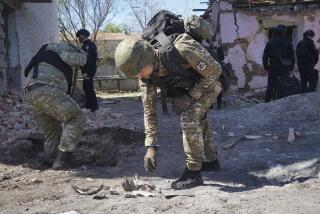Ethiopia Reports Fall of 3 More Eritrean Towns
A day after capturing a strategic border town, Ethiopian forces Friday penetrated deeper into Eritrea and announced the capture of three more locations.
Eritrean officials said the offensive proves that their southern neighbor was not committed to settling the two-year war between the African nations, but instead was intent on seizing this Eritrean capital.
The continued fighting “proves that the border issue was never their agenda,” said Yemane Gebremeskel, an Eritrean presidential advisor. “The issue was just a smoke screen. It was all just a matter of an invasion.”
Friday’s combat came after a pledge by Eritrea to pull the last of its troops out of disputed areas along the border--even towns that it considers part of its territory.
The recent hostilities threatened to further prolong the war, which initially was attributed to a dispute concerning the two nations’ poorly delineated 600-mile border.
Gebremeskel called on the international community to condemn Ethiopia’s actions and for the U.N. Security Council to impose sanctions. Otherwise, he said, “We have no choice but to fight it out.”
Ethiopia sent its forces into Eritrea on May 12 to retake territory captured by Eritrea two years ago.
Landlocked Ethiopia has denied that it has designs on the Eritrean port of Assab, about 50 miles northeast of the two nations’ border with Djibouti. And it insists that the loss of its Red Sea coast when Eritrea gained independence from Ethiopia in 1993 was not a factor in the war. Ethiopia also denies that its aim is to topple the government of Eritrean President Isaias Afwerki.
After a grueling two-day battle at the central front, Eritrea announced Thursday that it was withdrawing from all disputed territory, starting with the area around the mountaintop town of Zalambessa. The picture-postcard town was retaken by Ethiopians, who had controlled it until 1998.
By Friday afternoon, Ethiopia had announced its capture of Senafe, about seven miles to the north of Zalambessa, as well as two other towns in the area, Forte and Tsorena.
Ethiopian officials expressed skepticism Friday about Eritrea’s pledge to withdraw its troops from disputed lands, including a pocket of territory near the eastern border with Djibouti.
“If the rogue regime in Asmara were truly committed to withdrawing its troops from all Ethiopian lands, it would simply do it, rather than profess an intention to do so,” the Ethiopian government said in a statement.
In Nairobi, Kenya, Ethiopian Ambassador Teshome Toga confirmed that his government wanted to “incapacitate the military machines of Eritrea for the better security” of the region and vowed that “Ethiopia would not stop the fighting until it makes sure that Eritrea is not a threat to [our] national security.”
The Ethiopian offensive drew criticism here from some Western officials who said it was “a clear violation of the spirit and the content” of a cease-fire negotiated last year by the Organization of African Unity, or OAU.
Eritrea has agreed to talks scheduled to start Monday in Algiers under the mediation of Algerian President Abdelaziz Bouteflika, who also heads the OAU. But it remained unclear whether Ethiopia, having made substantial gains, will resume negotiations.
Western officials acknowledged that Eritrea’s vow to withdraw was due not only to a willingness to abide by the peace agreement but also to heavy losses suffered at the front.
Italian doctors volunteering their services at Asmara’s central hospital said that between 700 and 1,000 war wounded had received medical treatment during a 24-hour period this week.
Gino Strada, an Italian surgeon, said most of the patients he operated on had been quickly transferred to another location and the vacant beds immediately filled.
“It’s like being in a war shop here,” Strada said.
More to Read
Start your day right
Sign up for Essential California for news, features and recommendations from the L.A. Times and beyond in your inbox six days a week.
You may occasionally receive promotional content from the Los Angeles Times.







